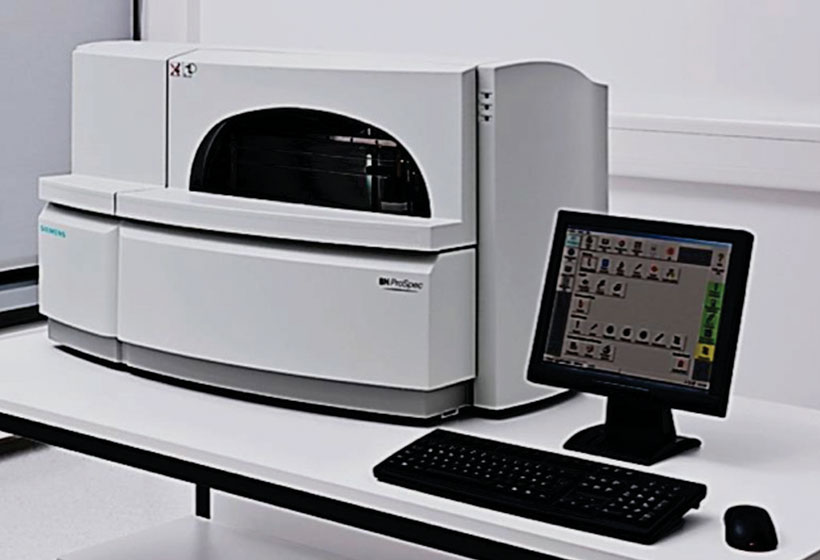Inflammatory Markers Predict Risk of Morbidity and Mortality
|
By LabMedica International staff writers Posted on 22 Dec 2016 |

Image: The BN ProSpec system and nephelometer (Photo courtesy of Siemens Healthcare).
Inflammatory markers are known to be associated with cancer, chronic heart disease and other serious health conditions; however, the marker that is most useful in predicting these diseases continues to be debated.
A new study looking at deaths from cancer, cardiovascular disease and all causes suggests that an inflammatory marker detected in blood tests in middle-aged adults can better predict the risk of death compared with another similar biomarker.
Scientists at the Institut National De La Santé Et De La Recherche Médicale (Paris, France) and their colleagues analyzed data for 6,545 men and women aged 45 to 69 (mean 55.7) years from the Whitehall II cohort study. They assayed the inflammatory biomarkers α1-acid glycoprotein (AGP), interleukin-6 (IL-6) and C-reactive protein (CRP) levels from fasting serum samples collected in 1997–1999 and mortality follow- up was until June 2015.
For CRP measurement, a high-sensitivity immunonephelometric assay was used in a BN ProSpec nephelometer (Dade Behring, Deerfield, IL, USA); IL-6 levels were measured with a high-sensitivity enzyme-linked immunosorbent assay (R&D Systems, Minneapolis, MN, USA); and AGP levels were measured with nuclear magnetic resonance spectroscopy as part of more complete biomarker profiling.
Over the mean follow-up of 16.7 years, 736 deaths occurred, of which 181 were from cardiovascular disease and 347 from cancer. AGP did not predict mortality beyond the first five years of follow-up while over this period; IL-6 and CRP had stronger associations with mortality. Only IL-6 predicted all-cause mortality (adjusted Hazard Ratio [HR] 1.22) and cancer-related mortality (adjusted HR 1.13), over the entire follow-up period, whereas CRP predicted only cardiovascular mortality (adjusted HR 1.30).
Archana Singh-Manoux, PhD, a professor and lead author of the study, said, “When a recent metabolomics study highlighted the importance of AGP, our question was how relevant is this marker when compared to other known inflammatory markers. The novelty of our approach lies in being able to assess risk of mortality in the short- and long-term. Our findings show IL-6, which is already known to be important to heart disease, to do better than AGP. Biomarker studies are progressing fast, and it is important to undertake checks like in the one in our study, to shape future research on biomarkers.” The study was published on November 28, 2016, in the Canadian Medical Association Journal.
Related Links:
Institut National De La Santé Et De La Recherche Médicale
Dade Behring
R&D Systems
A new study looking at deaths from cancer, cardiovascular disease and all causes suggests that an inflammatory marker detected in blood tests in middle-aged adults can better predict the risk of death compared with another similar biomarker.
Scientists at the Institut National De La Santé Et De La Recherche Médicale (Paris, France) and their colleagues analyzed data for 6,545 men and women aged 45 to 69 (mean 55.7) years from the Whitehall II cohort study. They assayed the inflammatory biomarkers α1-acid glycoprotein (AGP), interleukin-6 (IL-6) and C-reactive protein (CRP) levels from fasting serum samples collected in 1997–1999 and mortality follow- up was until June 2015.
For CRP measurement, a high-sensitivity immunonephelometric assay was used in a BN ProSpec nephelometer (Dade Behring, Deerfield, IL, USA); IL-6 levels were measured with a high-sensitivity enzyme-linked immunosorbent assay (R&D Systems, Minneapolis, MN, USA); and AGP levels were measured with nuclear magnetic resonance spectroscopy as part of more complete biomarker profiling.
Over the mean follow-up of 16.7 years, 736 deaths occurred, of which 181 were from cardiovascular disease and 347 from cancer. AGP did not predict mortality beyond the first five years of follow-up while over this period; IL-6 and CRP had stronger associations with mortality. Only IL-6 predicted all-cause mortality (adjusted Hazard Ratio [HR] 1.22) and cancer-related mortality (adjusted HR 1.13), over the entire follow-up period, whereas CRP predicted only cardiovascular mortality (adjusted HR 1.30).
Archana Singh-Manoux, PhD, a professor and lead author of the study, said, “When a recent metabolomics study highlighted the importance of AGP, our question was how relevant is this marker when compared to other known inflammatory markers. The novelty of our approach lies in being able to assess risk of mortality in the short- and long-term. Our findings show IL-6, which is already known to be important to heart disease, to do better than AGP. Biomarker studies are progressing fast, and it is important to undertake checks like in the one in our study, to shape future research on biomarkers.” The study was published on November 28, 2016, in the Canadian Medical Association Journal.
Related Links:
Institut National De La Santé Et De La Recherche Médicale
Dade Behring
R&D Systems
Latest Clinical Chem. News
- 3D Printed Point-Of-Care Mass Spectrometer Outperforms State-Of-The-Art Models
- POC Biomedical Test Spins Water Droplet Using Sound Waves for Cancer Detection
- Highly Reliable Cell-Based Assay Enables Accurate Diagnosis of Endocrine Diseases
- New Blood Testing Method Detects Potent Opioids in Under Three Minutes
- Wireless Hepatitis B Test Kit Completes Screening and Data Collection in One Step
- Pain-Free, Low-Cost, Sensitive, Radiation-Free Device Detects Breast Cancer in Urine
- Spit Test Detects Breast Cancer in Five Seconds
- Electrochemical Sensors with Next-Generation Coating Advances Precision Diagnostics at POC
- First-Of-Its-Kind Handheld Device Accurately Detects Fentanyl in Urine within Seconds
- New Fluorescent Sensor Array Lights up Alzheimer’s-Related Proteins for Earlier Detection
- Automated Mass Spectrometry-Based Clinical Analyzer Could Transform Lab Testing
- Highly Sensitive pH Sensor to Aid Detection of Cancers and Vector-Borne Viruses
- Non-Invasive Sensor Monitors Changes in Saliva Compositions to Rapidly Diagnose Diabetes
- Breakthrough Immunoassays to Aid in Risk Assessment of Preeclampsia
- Urine Test for Monitoring Changes in Kidney Health Markers Can Predict New-Onset Heart Failure
- AACC Releases Comprehensive Diabetes Testing Guidelines
Channels
Molecular Diagnostics
view channel
World’s First One-Minute Hepatitis C Antibody Test Facilitates Quick Triage
Rapid and accurate testing is crucial in the fight against Hepatitis C. Hepatitis C blood testing determines whether someone has been infected with the Hepatitis C virus. Having regular access to testing... Read more
Game-Changing Blood Test for Stroke Detection Could Bring Life-Saving Care to Patients
Stroke is the primary cause of disability globally and ranks as the second leading cause of death. However, timely early intervention can prevent severe outcomes. Most strokes are ischemic, resulting from... Read moreHematology
view channel
Next Generation Instrument Screens for Hemoglobin Disorders in Newborns
Hemoglobinopathies, the most widespread inherited conditions globally, affect about 7% of the population as carriers, with 2.7% of newborns being born with these conditions. The spectrum of clinical manifestations... Read more
First 4-in-1 Nucleic Acid Test for Arbovirus Screening to Reduce Risk of Transfusion-Transmitted Infections
Arboviruses represent an emerging global health threat, exacerbated by climate change and increased international travel that is facilitating their spread across new regions. Chikungunya, dengue, West... Read more
POC Finger-Prick Blood Test Determines Risk of Neutropenic Sepsis in Patients Undergoing Chemotherapy
Neutropenia, a decrease in neutrophils (a type of white blood cell crucial for fighting infections), is a frequent side effect of certain cancer treatments. This condition elevates the risk of infections,... Read more
First Affordable and Rapid Test for Beta Thalassemia Demonstrates 99% Diagnostic Accuracy
Hemoglobin disorders rank as some of the most prevalent monogenic diseases globally. Among various hemoglobin disorders, beta thalassemia, a hereditary blood disorder, affects about 1.5% of the world's... Read moreImmunology
view channel.jpg)
AI Predicts Tumor-Killing Cells with High Accuracy
Cellular immunotherapy involves extracting immune cells from a patient's tumor, potentially enhancing their cancer-fighting capabilities through engineering, and then expanding and reintroducing them into the body.... Read more
Diagnostic Blood Test for Cellular Rejection after Organ Transplant Could Replace Surgical Biopsies
Transplanted organs constantly face the risk of being rejected by the recipient's immune system which differentiates self from non-self using T cells and B cells. T cells are commonly associated with acute... Read more
AI Tool Precisely Matches Cancer Drugs to Patients Using Information from Each Tumor Cell
Current strategies for matching cancer patients with specific treatments often depend on bulk sequencing of tumor DNA and RNA, which provides an average profile from all cells within a tumor sample.... Read more
Genetic Testing Combined With Personalized Drug Screening On Tumor Samples to Revolutionize Cancer Treatment
Cancer treatment typically adheres to a standard of care—established, statistically validated regimens that are effective for the majority of patients. However, the disease’s inherent variability means... Read moreMicrobiology
view channel
Integrated Solution Ushers New Era of Automated Tuberculosis Testing
Tuberculosis (TB) is responsible for 1.3 million deaths every year, positioning it as one of the top killers globally due to a single infectious agent. In 2022, around 10.6 million people were diagnosed... Read more
Automated Sepsis Test System Enables Rapid Diagnosis for Patients with Severe Bloodstream Infections
Sepsis affects up to 50 million people globally each year, with bacteraemia, formerly known as blood poisoning, being a major cause. In the United States alone, approximately two million individuals are... Read moreEnhanced Rapid Syndromic Molecular Diagnostic Solution Detects Broad Range of Infectious Diseases
GenMark Diagnostics (Carlsbad, CA, USA), a member of the Roche Group (Basel, Switzerland), has rebranded its ePlex® system as the cobas eplex system. This rebranding under the globally renowned cobas name... Read more
Clinical Decision Support Software a Game-Changer in Antimicrobial Resistance Battle
Antimicrobial resistance (AMR) is a serious global public health concern that claims millions of lives every year. It primarily results from the inappropriate and excessive use of antibiotics, which reduces... Read morePathology
view channel
Groundbreaking CRISPR Screen Technology Rapidly Determines Disease Mechanism from Tissues
Thanks to over a decade of advancements in human genetics, scientists have compiled extensive lists of genetic variations linked to a wide array of human diseases. However, understanding how a gene contributes... Read more
New AI Tool Classifies Brain Tumors More Quickly and Accurately
Precision in diagnosing and categorizing tumors is essential for delivering effective treatment to patients. Currently, the gold standard for identifying various types of brain tumors involves DNA methylation-based... Read moreTechnology
view channel
New Diagnostic System Achieves PCR Testing Accuracy
While PCR tests are the gold standard of accuracy for virology testing, they come with limitations such as complexity, the need for skilled lab operators, and longer result times. They also require complex... Read more
DNA Biosensor Enables Early Diagnosis of Cervical Cancer
Molybdenum disulfide (MoS2), recognized for its potential to form two-dimensional nanosheets like graphene, is a material that's increasingly catching the eye of the scientific community.... Read more
Self-Heating Microfluidic Devices Can Detect Diseases in Tiny Blood or Fluid Samples
Microfluidics, which are miniature devices that control the flow of liquids and facilitate chemical reactions, play a key role in disease detection from small samples of blood or other fluids.... Read more
Breakthrough in Diagnostic Technology Could Make On-The-Spot Testing Widely Accessible
Home testing gained significant importance during the COVID-19 pandemic, yet the availability of rapid tests is limited, and most of them can only drive one liquid across the strip, leading to continued... Read moreIndustry
view channel
Danaher and Johns Hopkins University Collaborate to Improve Neurological Diagnosis
Unlike severe traumatic brain injury (TBI), mild TBI often does not show clear correlations with abnormalities detected through head computed tomography (CT) scans. Consequently, there is a pressing need... Read more
Beckman Coulter and MeMed Expand Host Immune Response Diagnostics Partnership
Beckman Coulter Diagnostics (Brea, CA, USA) and MeMed BV (Haifa, Israel) have expanded their host immune response diagnostics partnership. Beckman Coulter is now an authorized distributor of the MeMed... Read more_1.jpg)













